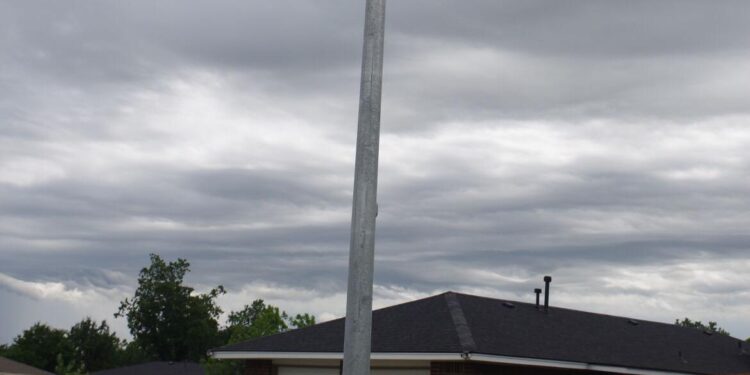The City of Lawton is issuing a “stop work” order on a construction project that is installing a small cellphone tower in a northwest Lawton neighborhood, while other potential sites are explored.
Connie Wood had wanted the City Council to order removal of the small tower that U.S. Cellular is installing at her home on Arrowhead Drive, saying there are nearby sites that will work just as well. Council members were willing to concede that Wood had a point with her criticisms, with several city officials saying they wouldn’t want a similar device installed in front of their homes. But other council members said city officials and the general public are going to have to make peace with such projects as cellphone carriers improve their systems to handle 5G coverage.
The issue isn’t a new one for the council: a property owner on Micklegate Boulevard also says placement of the cellphone pole on the side of her house is distracting from the property value and was incorrectly placed.
Community Services Director Charlotte Brown said while neither pole was placed exactly where their revocable permits said they would be placed, there was significant difference in how far off approved plans they were. The pole on the property at 7990 Micklegate Boulevard is 3 feet south of its approved placement, while the pole at 6432 Arrowhead Drive is 1 foot west and 1.5 feet north of where it was permitted to be.
Brown said the pole’s placement in the side easement of Wood’s home isn’t significantly different than the location cited in the permit, which is why city staff wasn’t recommending the permit be revoked.
Wood said U.S. Cellular has the option of relocating the cellphone tower to a park two blocks from her home. Brown said U.S. Cellular said that park isn’t an option. In a statement, the carrier said changing the tower’s location would not allow U.S. Cellular to “effectively offload the traffic from existing cell site in our network” because each Lawton site was selected for optimal work. Moving the Arrowhead Drive tower to Great Plains or Crosby Park parks would not work because they are not near the concentration of users “that we are targeting in this location,” U.S. Cellular representatives said.
Wood said the pole is distracting, calling it “extremely large and ugly.” She said moving the tower to a suitable nearby location would give the City of Lawton what it wanted while still allowing U.S. Cellular to boost its power without damaging her home.
“I request this permit, which is out of regulations, be revoked,” she said, explaining that by “out of regulations” she means the tower was not placed where it was cited in the permit.
Council members questioned the tower placement process in general, with Ward 3 Councilwoman Linda Chapman asking why towers are being placed in front of homes in residential neighborhoods.
“I wouldn’t want that either,” she said.
Brown said city officials had asked U.S. Cellular about co-locating on existing PSO power poles, but that apparently isn’t an option between the two utility companies.
City Manager John Ratliff, conceding he wouldn’t want the pole in front of his house, said city officials will look at the issue frequently in coming years, from residents who don’t like the locations and from cell companies who say they can’t move towers because they won’t provide the necessary coverage. But Brown said the city code controlling placement of small cellphone towers — enacted by the City Council in late 2021 — allows the council to revoke permits for any reason.
Council members indicated they wanted other site options explored before they make a decision to revocation, with options to include two nearby parks and a vacant strip of land that Ward 2 Councilman Kelly Harris estimated was 150 feet away from the pole’s current location. The “stop work” order will remain in place while officials explore those options.
Arrowhead Drive is one of 26 locations approved for use by U.S. Cellular in four council decisions that occurred between the ordinance’s enactment and June 2023. City code allows towers to be placed on city easements as long as they conform to specific criteria, including specific distances from roads, waterlines and sewer lines.
Want to reach a local audience and grow your business?
Our website is the perfect platform to connect with engaged readers in your local area.
Whether you're looking for banner ads, sponsored content, or custom promotions, we can tailor a package to meet your needs.
Contact us today to learn more about advertising opportunities!
CONTACT US NOW



